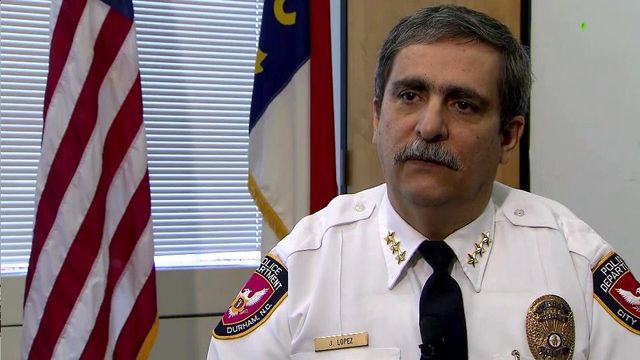Chief: Sanctuary city ban could hurt Durham policing
Police Chief Jose Lopez said Thursday that a new state ban on so-called "sanctuary city" policies could detract from Durham's efforts to work with immigrant residents to deter crime.
Posted — UpdatedGov. Pat McCrory last week signed into law legislation that prohibits any North Carolina county or municipality from restricting local law enforcement's ability to cooperate with federal immigration officials.
The Protect North Carolina Workers Act also bars government agencies from using consular or embassy documents to verify someone's identity or residence, as well as requiring state and local government agencies to use the E-Verify system to check the legal status of job applicants and contractors.
Durham is one of several North Carolina municipalities – Chapel Hill and Carrboro are among the others – that have in the past instructed local law enforcement and other officials not to ask the immigration status of people with whom they come into contact or to ignore deportation orders in some cases.
Pilar Rocha-Goldberg, president and chief executive of El Centro Hispano in Durham, which supports the Latino community, said the center's clients have expressed anxiety over the law.
"It's really hurting the community," Rocha-Goldberg said. "They feel, if they can't identify themselves and if the police can start asking and are empowered to ask for immigration status and they don't have documents, they could be deported."
Lopez said he doesn't understand the arguments of supporters of the law who say it will help police do their job. Rather, he said, the law gives people in the U.S. illegally one more reason to distrust or even fear police, even when they have been victimized by crime.
"They are going to avoid the police, and the sad part is they are going to avoid the police as victims, as individuals who have information of criminal activity and, sadly enough, as individuals participating in police-related activities," he said.
Rocha-Goldberg agrees, predicting that the anxiety among undocumented residents will drive a wedge between the Latino community and police statewide.
"They are not calling police and not cooperating to catch criminals," she said.
"As they live in that fear, they are going to teach their children that fear, and their children are going to grow up alienated from the police," Lopez said.
The Durham Police Department will comply fully with the law, he said, adding that he doesn't think it will change much of how his force operates because it allows law enforcement the discretion of accepting consular IDs.
The Mexican consulate in Raleigh launched a campaign Thursday to educate people about the law, which officials said has prompted much confusion and misinformation.
Consul General Javier Diaz de Leon said he worries that people might take advantage of immigrants because of the confusion over consular ID cards and wants immigrants to be wary of paying anyone anything because of the new law.
"It's still valid in many other ways, especially in private transactions in North Carolina," Diaz de Leon said of the consular IDs. "We have even heard some people approach us, asking us if the consulate is still open. There are some people thinking that (the state law) means that the Mexican consulate is no longer in operation, which is totally absurd."
The North Carolina Justice Center last week began operating a bilingual hotline – 919-526-0676 – to answer questions about the law and hear from people how it's being enforced.
• Credits
Copyright 2024 by Capitol Broadcasting Company. All rights reserved. This material may not be published, broadcast, rewritten or redistributed.






